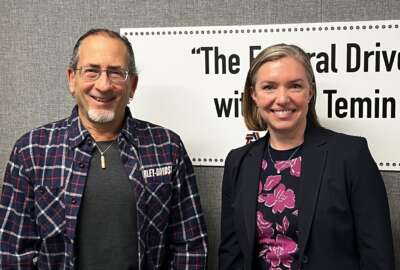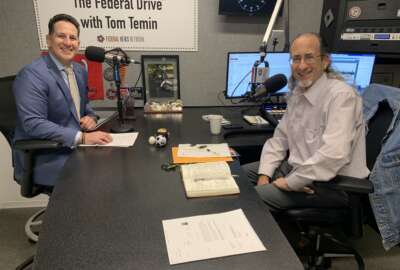There’s a gap in federal oversight of retirement advisors
"We made two recommendations to the IRS to improve its oversight over conflicts of interest," Kris Nguyen said.
For most Americans, retirement income is self-funded. And there’s no shortage of people selling advice on managing 401Ks or IRA. Some advisors, though, have built-in conflicts of interest. Federal rules and regulations for this type of work, though, are spotty, according to the most recent study by the Government Accountability Office. The Federal Drive with Tom Temin spoke to GAO’s director of education, workforce and income security, Kris Nguyen.
Interview transcript:
Tom Temin And what were you looking at here? This is first of all, you were looking at the state of financial advisers that come in different stripes and flavors, some of which are probably better for individuals than others.
Kris Nguyen We were asked by Congress to look at conflicts of interest and investment advice impacting retirement investors with a particular focus on the impact of the 2016 DOL fiduciary rule. Now, this rule aimed to expand the definition of what a fiduciary is. And it’s important to note that the rule was vacated in 2018. So specifically, we looked at three things. How industry changes to address the 2016 fiduciary rule, how conflicts are communicated and the associated investment return. And lastly, federal oversight in this area.
Tom Temin All right. Well, let’s begin at the beginning here. What is a fiduciary and what is a non fiduciary, and what’s the difference? And why does that matter?
Kris Nguyen Fiduciary just simply, and we can get into the legal definition of what a fiduciary is. But to put it simply, is someone who is in the position of trust and who has interest in providing advice to the retirement investors. And how that definition is determined by law and regulations. And DOL has an important role in defining that. The definition is currently stated with the rule from 1975. And we’ll talk a little bit more how DOL is aiming to change that.
Tom Temin Right. But in general, a fiduciary is someone that’s not also selling you something they make a profit on.
Kris Nguyen This is where we get into the potential conflicts of interest. A fiduciary can be your investment advisor. And this is what our aim is looking at, is to what extent the financial advisor may have conflicted interest with the investment advisor. And this comes in the form of compensation. The investment advisor may have the interest to sell products that bring them the highest compensation, and that may conflict with the interest of an investment advisor, I’m sorry, the retirement investor. And how this plays out is that, what is the impact on this? The impact on this is that what we found is that it can be associated with lower returns. We looked at the data for Morningstar on mutual funds from 2018 to 2021. And what we found is that when mutual funds that compensate investment advisors for when their clients purchased these funds, it shows a lower return. And as you can imagine, with the low return, it impacts the growth of the retirement savings for investors. So therefore, it’s really important to understand how conflicts of interest plays out, and how it impacts participants.
Tom Temin And is the Department of Labor’s role in this simply to have a definition of fiduciary, or do they have some regulatory function here?
Kris Nguyen Well, the responsibilities we focus in, there are many players because this deals with the financial market, but we focused in more on the DOL, as well as the IRS. To put it simply, IRS has the sole enforcement authority over prohibitive transactions, which protects investment investors over conflicts of interest. And DOL has the interpretive authority. So they define what prohibited transactions are.
Tom Temin OK. We’re speaking with Kris Nguyen. She’s director of education, workforce and income security at the Government Accountability Office. And you mentioned that in 2016, the Labor Department tried to update a 50-year-old definition of fiduciary. What was their aim there, and what happened?
Kris Nguyen Well, the aim is to expand the definition of what a fiduciary is. A lot of things have evolved, including the growth of IRAs, which has about $11 trillion, about 30% of the retirement savings. So among other things, the expansion included the inclusion of advice pertaining to rollovers from an employer plan to IRAs. And again, as I noted, that this rule was vacated in 2018.
Tom Temin That was after a court challenge.
Kris Nguyen It was vacated by the Fifth Circuit Court. It’s also important to note that more recently in 2024, DOL introduced the fiduciary rule with a different and expanded definition. And again, it’s facing a court order for stay. So that now is in effect. The stay is in effect.
Tom Temin So the stay is in effect, therefore, the 1975 definition is still in effect. And this is before the rise of so many investment instruments and so many investment instrumentalities like the Internet, for example. This rule that is in place predates all of that.
Kris Nguyen The 1975 is in effect, yes.
Tom Temin All right. Well, so given that things stand the way they do, what’s GAOs conclusion here? And what are you recommending? What would you have Labor Department and if necessary, IRS do at this point? Is there anything they can do?
Kris Nguyen We made two recommendations to the IRS to improve its oversight over conflicts of interest, specifically the oversight of prohibitive transactions. Now, what we found is that, this is through our undercover calls to 75 different firms. We found that it is very difficult for investors to navigate conflicts of interest. And unless the conflicts of interest is mitigated, their retirement savings can be hindered, as we discussed earlier. So it’s really important for the IRS who has the enforcement authority to take a proactive approach in monitoring prohibited transactions. Currently, the IRS is relying on firms and financial professionals to self-report noncompliance. We’re delighted to have the agency, IRS to concur with our recommendations. We believe that when our recommendations for IRS to adopt this recommendation, it would enhance the protection for retirement investors.
Tom Temin And by the way, what is a good example of a prohibited transaction that someone would encounter that you might have found in making the calls that you made to the investment firms?
Kris Nguyen There are different examples, but I’ll go to the most simple one, which is what one might expect, is for the parties involved, and it can be financial advisor to not engage in a transaction that is not in the best interest of the investor or the participant.
Tom Temin Right. So they would sell something maybe that is not in the best interest, and the investor would buy it and the compensation of value to the seller is that transaction. But it doesn’t really benefit the investor.
Kris Nguyen That’s correct. To put it simply, the compensation, the advisor may aim for a product that would bring them higher compensation, and yet it may not yield a higher investment return. So it would not be in the best interest of the investor, but in the best interest of the advisor instead.
Tom Temin And any recommendations for the Labor Department?
Kris Nguyen All recommendations were directed to the IRS. One is to take a proactive approach to enforcement, and the other is to engage in collaboration and coordination with DOL, given its role for defining what prohibited transactions are.
Tom Temin Right. So labor defines them, IRS enforces them?
Kris Nguyen That’s correct.
Tom Temin Well, sounds like important work because, as you say, $11 trillion of future retirees or current retirees savings are involved here. That’s a pretty big chunk of the economy when you count up the cash.
Kris Nguyen It’s a sizable amount of money. And this is retirement savings, and it’s one’s life savings. So it’s very critical to the retirement investors and their financial security.
Copyright © 2025 Federal News Network. All rights reserved. This website is not intended for users located within the European Economic Area.
Tom Temin is host of the Federal Drive and has been providing insight on federal technology and management issues for more than 30 years.
Follow @tteminWFED






